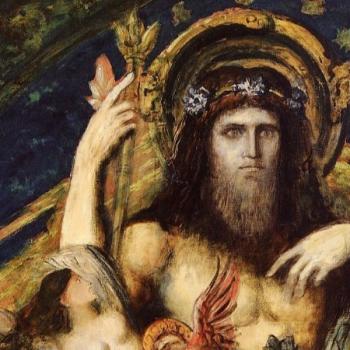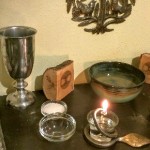Segomâros Widugeni is an author, blogger, and one of the leading lights of today’s Gaulish Polytheism. He talked to our Sean Harbaugh about finding Paganism, the Polytheist movement, and where to begin when looking into the Celtic Recon path.
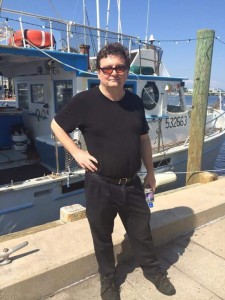
Segomâros Widugeni: I am a rather ordinary, middle class white guy of Norwegian, Swedish, and German-Hungarian descent. I have roots in rural northwest Minnesota and North Dakota, where my great-grandparents settled after leaving the Old Country. My family’s rural, immigrant origin gives me some connection to various aspects of pre-modern ways of life and thought, though I myself grew up in a typical American suburb, so we can’t take this too far. I went to high school and college in Saint Paul, Minnesota, and then attended grad school in Madison, Wisconsin, and Urbana-Champaign, Illinois. I was the first person in my family to finish college, and my brother was the second, though my father attended without graduating.
I was severely bullied as a kid. This had various consequences we won’t go into here, but the most interesting from the point of view of this interview is that it left me very alienated, searching for identity, and open to alternative points of view. This had a direct effect on my being attracted to Paganism/Polytheism.
How did your pagan path evolve? Can you describe your personal practice?
I first discovered Paganism at age 13, when I found a copy of Ray Buckland’s Witchcraft from the Inside, on the shelves of my junior high school library. At first, I was a bit skeptical, but further reading led to my gradual adoption of Paganism. My first explorations were as a teenager, including a very brief meeting with Carl Weschke at the then-open Gnostica Bookstore, when I was still 13, and a conversation with Morning Glory Zell at the Minnesota Renaissance Festival, when I was 15.
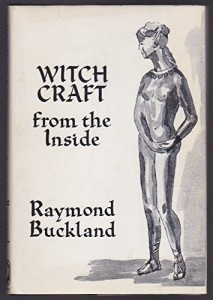 My first training was in eclectic Wicca in the early 1980s, when I got to college. I had always been drawn to the ancient Celts, for the typical Romantic sorts of reasons, and had started reading Irish and Welsh mythology in the 8th grade. When I started my training, I was told I was studying the ancient Celtic religion. This notion lasted as long as my first ritual. I knew enough to be immediately aware that what I was seeing wasn’t Celtic at all, but derived from Ceremonial Magic. Within a year, while still studying with that early coven, I began researching how to create a really Celtic form of Paganism.
My first training was in eclectic Wicca in the early 1980s, when I got to college. I had always been drawn to the ancient Celts, for the typical Romantic sorts of reasons, and had started reading Irish and Welsh mythology in the 8th grade. When I started my training, I was told I was studying the ancient Celtic religion. This notion lasted as long as my first ritual. I knew enough to be immediately aware that what I was seeing wasn’t Celtic at all, but derived from Ceremonial Magic. Within a year, while still studying with that early coven, I began researching how to create a really Celtic form of Paganism.
A year later, I met with Murtagh anDhoile at Pagan Spirit Gathering 1985, which was the year the seeds of Celtic Reconstructionism were planted at various meetings in which Murtagh and others participated. This confirmed me in following a Celtic path, and energized me to develop it further. I taught my first class in Celtic Paganism at Pagan Spirit Gathering 1986, and did a private, non-Wiccan ritual at Pagan Spirit Gathering 1987.
I developed the beginning of the Irish practice profiled in Celtic Flame when I was living and working in New Orleans, in 1991-1992. In 1992-1993, in Ohio, I wrote the first “Celtic Outline”, of which Celtic Flame was the distant descendent. I returned to Minnesota in 1993, and founded a small group that helped me refine my practice further. In 1995-1996, I wrote a book called Walking with the Gods, which described my practices and knowledge as of that time, that I shopped around to various publishers. Although it remained unpublished, it formed the basis of Celtic Flame. The chapters on the Otherworld and on Death and the Dead were taken from it verbatim, and the chapter on deities very closely based on it.
Starting in about 1995, I began participating in Celtic Reconstructionism online. That participation was limited after 1998, because I was working in small, conservative towns in the Midwest. But I was in Imbas for a couple of years, and networked with some early online groups. In 2001, I founded an Irish tuath, which lasted a couple of years. The class handouts for that tuath’s training program, themselves based on material from Walking with the Gods, essentially formed the text of Celtic Flame. I had to flesh it out slightly, fix some errors, and edit a bit, but that was it.
In 2004, I got into a long-term relationship with my current wife, and in 2005 I got a job in Florida. The two are related, seeing that she is from here, and that was why I looked down here. At the same time, I shifted decisively toward Gaulish practice. This had been a long time in coming. I had begun practicing Gaulish alongside Irish as early as 1992, but at the time I believed it was impossible to reconstruct it, and that there was no interest in it – that I would be alone if I did it. The increasing availability of research materials, especially online, began to change my mind. After 2004, it was clear that I could learn Gaulish, and learn how to worship the Gaulish deities.
I’ve now been living in rural Florida for 10 years, practicing Gaulish the whole time. The land here has become a part of my practice. I have good relations with the local spirits, both former-human and not, and a good understanding of the local culture. I participate in the community where I live. My Gaulish practice is satisfying and inspiring. I have a good life.
Celtic Flame was effectively done as early as 2004, except for the editing. When I moved toward Gaulish practice, I sat on it, because I didn’t want to publish a book on a path I no longer followed. But that left me in a dilemma. Here I was with all this work, all this material, and it was doing no one any good. Eventually, I gave in to my own sense that something good should come from all those years of work, and I published Celtic Flame in 2009.
I started to become involved in online Gaulish Polytheism about in 2011, I think. It was as much a matter of luck as anything else. I discovered the Gaulish Polytheism Community on Facebook, and found myself a leader in it almost by accident. At the same time, I was doing well financially, and this allowed me to purchase the best available sources on Gaulish language and religion. My knowledge leaped forward and I found myself with a Gaulish practice that was roughly the equal of the Irish practice that had inspired Celtic Flame.
In 2013, I discovered the online Polytheist community. This was a result of my searching for various forms of Reconstructionism that I hadn’t encountered before, out of idle curiosity. That led to my finding the Anomalous Thracian, and, through him, various other online Polytheists. Eventually, this led to my getting my column, Nemeton Segomâri, on Polytheist.com, in 2014. More recently, I have begun working on an umbrella group for Gaulish Polytheists called Toutâ Galation. Stay tuned for more developments!
A major influence on this latest activity is that I developed renal carcinoma in November, 2011. I had a kidney removed on November 27, 2011, which took care of the cancer completely. There were complications. The recovery was slow and painful. The experience taught me that I had to get my priorities straight, to do the things that really matter to me. This moved my spiritual life to front and center of my existence, and so changed things in many ways.
In terms of my personal practice, I make offerings once per month, as well as on major holidays. I also offer a stick of incense a day to the Gods, when I can. My relationship with the Gods these days is quiet and cordial, undramatic yet powerful, at least to me. I also practice British Traditional Wicca, though I keep that and my Gaulish practice strictly separate.
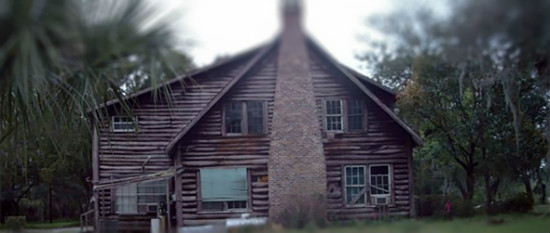
You have an interesting name? What does it translate to? You also go by the pen name Aedh Rua, which means “red fire”, how did you adopt that?
Segomâros is a common Gaulish first name meaning “Great Force”, or “Great Victory”, or “Great Power”. Really, all three. There are a couple of people by that name mentioned in inscriptions. I wanted a name that was totally authentic, and so went the route of least originality, a name that I knew had been used in real history by rather ordinary people. Widugeni means “of the forest born”, and is a reference to my grandfather, who was quite the woodsman. Aedh Rua came to me in a dream many years ago, in which I heard a female voice calling me by that name. I didn’t know what it meant, then, or, really, anything about it. I learned about it by researching it in the pre-internet era. But the dream came before the research.
You describe yourself as a Celtic Reconstructionist with a practice in Gaulish polytheism. With so little information aside from Roman sources, how did you reconstruct Gaulish practice?
I use a lot of applied linguistics for getting a handle on the Gaulish worldview and philosophical vocabulary. A remarkable amount is known about the Gaulish language, and much of that is of immediate value to reconstructing the religion. It doesn’t hurt that several of our best known inscriptions are magical in nature, and contain terms and ideas of immediate use. In addition, one must use the Roman sources, with caution, as well as archeology, material from medieval Irish and Welsh texts, modern Celtic folklore, and Indo-European studies. It helps that there is a lot of useful scholarship from people like Xavier Delmarre, David Stifter, Bernard Mees, Garrett Olmsted, Jean-Louis Brunaux, Michael Enright, Raimund Karl, and Kim McCone, among others – all of which are of immediate use in reconstructing the Gaulish worldview and religion.
As a founder in the Celtic Recon movement, what do you make of the argument of polytheists not considering themselves pagan?
I can see the merits of both sides. On the one hand, there are big differences in approach between most forms of Polytheism and mainstream Paganism, including Wicca. These differences suggest that we are really seeing at least two, and more likely several different religions. On the other hand, these religions have a lot in common, too. Perhaps most important, they are treated very similarly by outsiders, who regard them as the same. This suggests that, whatever the differences between Pagans and Polytheists, it is the best interests of both to work together, while also recognizing the frequent need for separate spaces and approaches.
What is your opinion regarding atheopaganism? Why is there such a tension between that group and the rest of the pagan community?
There is a long tradition of tolerance in the Pagan Community, and various types of non-theistic Pagans have been accepted for decades. The difference now is that atheopagans are growing more assertive, as are the Polytheists, and the two approaches rub each other the wrong way. As often as not, the conflicts seem to boil down to atheopagans expressing disrespect for things other Pagans and Polytheists alike hold sacred. The situations are exacerbated by class and culture dynamics going on, and the relative ease atheopagans have in assimilating to mainstream society.
The matter isn’t helped by some of the personalities involved. It is probably in the best interest of both sides to recognize their differences and commonalities. Polytheists and Pagans have to accept that atheopagans don’t believe as we do, and don’t hold sacred what we do. At the same time, atheopagans have to recognize that other Pagans hold certain things sacred and take their religions seriously, and that the decent thing to do is to respect them.
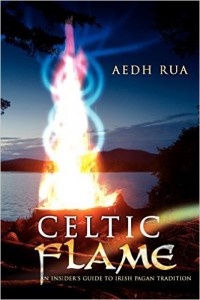 You wrote the book Celtic Flame: An Insider’s Guide to Irish Pagan Tradition under your pen name Aedh Rua. What was your mission in writing this book? Did it turn out as intended? Are you planning any follow-ups?
You wrote the book Celtic Flame: An Insider’s Guide to Irish Pagan Tradition under your pen name Aedh Rua. What was your mission in writing this book? Did it turn out as intended? Are you planning any follow-ups?
As I alluded to above, my intention in writing Celtic Flame was to get some good from all the years of study I had put in, and all the material I was effectively sitting on. I never intended it to be more than that. The mission was simply to get the information, and my perspective on it, out there. When I first published the book, it appeared that this mission was not going to be achieved, but in the years since, Celtic Flame has come into a greater degree of acceptance, so I feel better about it.
I don’t have any plans for a followup. There are now plenty of good Irish Reconstructionist books out there, so there is no more need for me to write on the topic. I might write a book on Gaulish Polytheism, but right now, I’m arguably reaching as many people through my online presence as through a book, so I don’t feel any heavy pressure at this point. Only time will tell.
In your poem Adbertos Yemoni – The Sacrifice of Yemonos, you wrote a creation story based on the common Indo-European theme of man kills twin, dismembers twin, and then creates the world out of his body parts. You see this with Ymir in Norse tradition, as well as Romulus and Remus in Rome. Tell me about how you came to write such a beautiful poem?
I had long been fascinated by that particular Indo-European myth, and had worked with it in various ways before. The last portion of the poem, “from his bones, the stones were made”, etc., I wrote when I was writing Gaulish poetry about the same time I published Celtic Flame. The bulk of the poem, though, was written as a bit of a lark.
I was at a City Commission meeting, as a department head, not a Commission member, in the small, Florida community where I was working at the time. My presence was required, but I wasn’t on the agenda, nor was there any likelihood that my department would even be mentioned. To surf the net on my phone would have been rude, as would reading a book, so I was stuck staring at the walls for three hours. I took out a notebook and pen, and inspiration came. The local Chief of Police, a strong Baptist, was sitting slightly to one side and behind me. He could see what I was writing, so I wrote not a word of English. I translated it later. He saw what I was doing, but was polite enough not to ask about it.
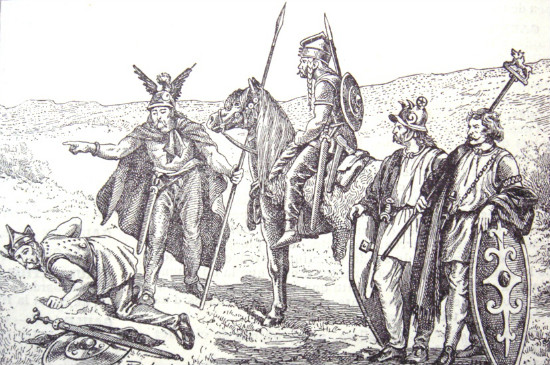
In your column Uoxtlos ambi Keltûs Galatîsc – A Word about the Celts and Gauls, you state that “There is no place is Gaulish Polytheism for racism or racial theories”, and “Anyone who is called by the Gaulish Gods, Spirits, and Ancestors is welcome. There is no reason to exclude anyone.” I think this is very important to stress. Can you expand on this for our readers?
Sure. Let’s put it this way: everyone has two parents, four grandparents, eight great-grandparents, and so on. By the time you get to the Iron Age, each of us has many millions of ancestors, from innumerable groups, tribes, and cultures. DNA testing can only measure down to about ½ of 1%, which is still nowhere near the time depth needed to reach Gaulish-speaking ancestors. So, essentially anyone can have Gaulish ancestry. Indeed, so many more people have Gaulish ancestors than don’t, that the best bet is to assume that any given person does. There is no reason to exclude anyone.
However, even that assumes the Gauls measured “Gaulishness” by blood or descent. The evidence of this is limited. On the one hand, Caesar says that the Gauls counted themselves as descendants of Dis Pater. On the other, different Greco-Roman historians record the Gauls as regarding themselves as a mixed people – one part indigenous, one part from the isles of the sea, and one part from across the Rhine. At the very least, then, there is the possibility that the Gauls took pride in being a mixed people.
Certainly, the term Celtic does not, in proper academic use, denote any kind of descent or “racial” group. It denotes a language and culture. People are Celtic insofar as they speak a Celtic language and/or participate in the Celtic cultural continuum. People who talk of Celtic DNA or a Celtic “Race” are not only morally wrong, they are historically incorrect.
The matter is even more questionable for the Gauls, where no cultural continuum exists. Here, we have an ancient culture that cannot be demonstrated as having a preoccupation with descent, whose DNA is distributed among the peoples of the world, who have no continuous cultural or corporate identity, and who must be consciously revived in modern times. I can’t think of a worse candidate for a racial theory except maybe the Sumerians.
It should also be pointed out that there is a scholarly and scientific consensus that the mere existence of race is total bunk for everything except maybe physical appearance. No reputable anthropologist, biologist, or geneticist supports the notion that races have mental characteristics or that biological descent groups can be linked to language or culture by anything but historical coincidence, or that culture is passed down genetically. Not one decent scholar supports such ideas. While there is some evidence that trauma can be passed down to one’s descendants epigenetically, there is no evidence that specific kinds of trauma, or memories, or historical consciousness can be. Such notions are pseudo-science at best. They are rightly regarded as pernicious garbage by reputable scholars and scientists.
On a more personal note, a matter on Unverified Personal Gnosis, the “UPG” dreaded in Recon circles, I have never noted the Gaulish deities or ancestors to be other than welcoming and hospitable to all who wish to worship Them. They are generally happy to work with anyone who works with them, no matter what the descent. In some cases, They are most insistent in entering people’s lives. They call whom They call, regardless of descent.
You have two Masters Degrees, one in 20th Century German History and the other in Library Science. You also speak two Celtic languages. How has your education and ability to speak the languages made researching and reconstructing Celtic spirituality easier? Does speaking the languages allow you to connect to the gods easier?
There’s no question that my education has made me tremendously privileged and given me great advantages, spiritually and otherwise. I am forever grateful to my parents who sacrificed to give me that education.
My academic background taught me how to do research, how to write in an academic style, how to analyze texts, how to think critically, how to outline my own thoughts in a systematic way, and how to speak in an educated and authoritative way. My education also gave me a career, and therefore the income to buy rare and expensive books and articles. It has made my path vastly easier.
So, is a lot of formal education necessary to do Reconstructionism or Polytheism? No. I know people who grew up with none of the advantages I had, who have mastered everything I have, but done better at it. They are better researchers and writers than I am, and had to work harder to get there.
I do not find that the Gods speak more easily to those who speak Celtic languages. What I do find is that the mastery of those languages enables people to think in authentic and ancient Celtic ways. It’s not about the Gods understanding us, for They are Gods, wise and mighty. They can speak English, if They wish, or any other language. It is about our understanding the Gods, ancestors, and the texts in which they are discussed, on Their own terms.
What books do you recommend for someone interested in pursuing a Celtic Recon path?
The Apple Branch: a Path to Celtic Ritual, by Alexei Kondratiev; Celtic Flame: an Insider’s Guide to Irish Pagan Tradition, by Aedh Rua; Pagan Portals – Irish Paganism: Reconstructing Irish Polytheism, by Morgan Daimler; Pagan Portals – the Morrigans: Meeting the Great Queens, by Morgan Daimler; By Land and Sea and Sky, by Morgan Daimler; Where the Hawthorn Grows: an American Druid’s Reflections, by Morgan Daimler; Pagan Portals – Brigid: Meeting the Celtic Goddess of Poetry, Forge, and Healing Well, by Morgan Daimler; Teagasca: The Instructions of Cormac mac Airt, by C. Lee Vermeers; Celtic Heritage: Ancient Tradition in Ireland and Wales, by Alwyn and Brinley Rees; Deep Ancestors: Practicing the Relgion of the Proto-Indo-Europeans, by Ceisiwr Serith; The Celtic Gauls: Gods, Rites, Sanctuaries, by Jean-Louis Brunaux; Lady with a Mead Cup: Ritual Prophecy and Lordship in the European Warband from LaTene to the Viking Age, by Michael Enright; The Gods of the Celts, by Miranda Green; The Book of the Great Queen: the Many Faces of the Morrigan from Ancient Legends to Modern Devotions, by Morpheus Ravenna. And that’s to name a few.
What is your greatest passion?
Right now, my greatest passions are living a good, quiet life, worshiping the Gods, and restoring Gaulish Polytheism. I would like for it to be a thing again, to have enough people involved, resources available, and institutions in place that it will endure. At this point in my life, that is pretty much my only agenda.
Thank you for answering my questions. Do you have anything else you’d like to add?
Well, I’d like to thank you for the opportunity to interview with you. For more information, check put the Gaulish Polytheism Community on Facebook. You can also get much information from my regular column at Polytheist.com, Nemeton Segomâri: Gaulish Polytheism in the Woods of Central Florida.




